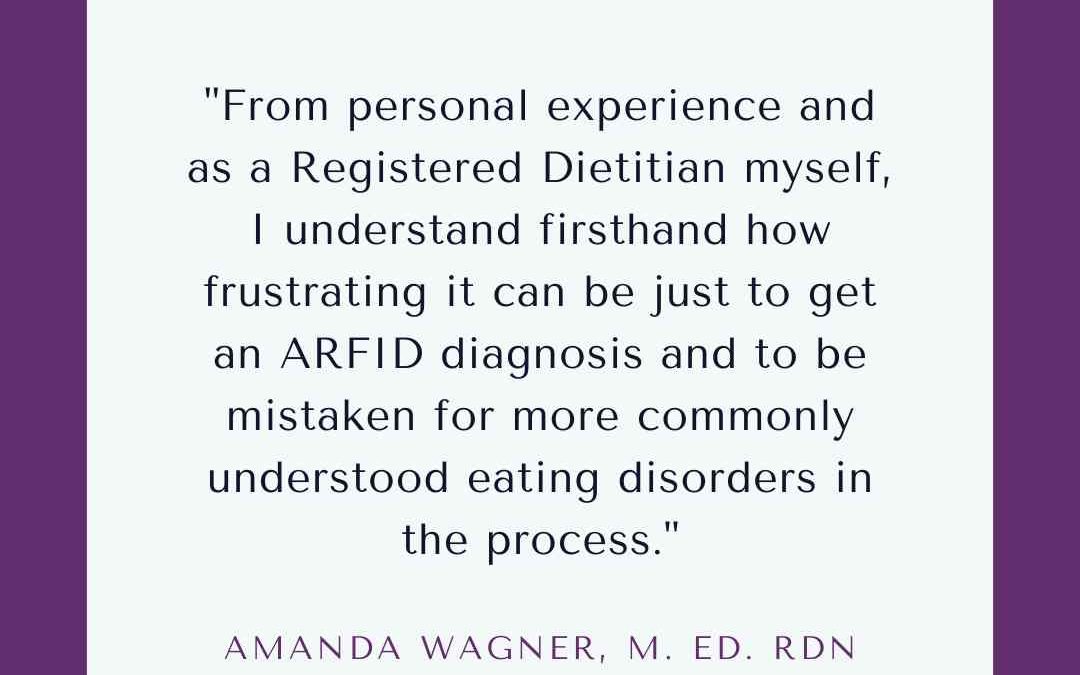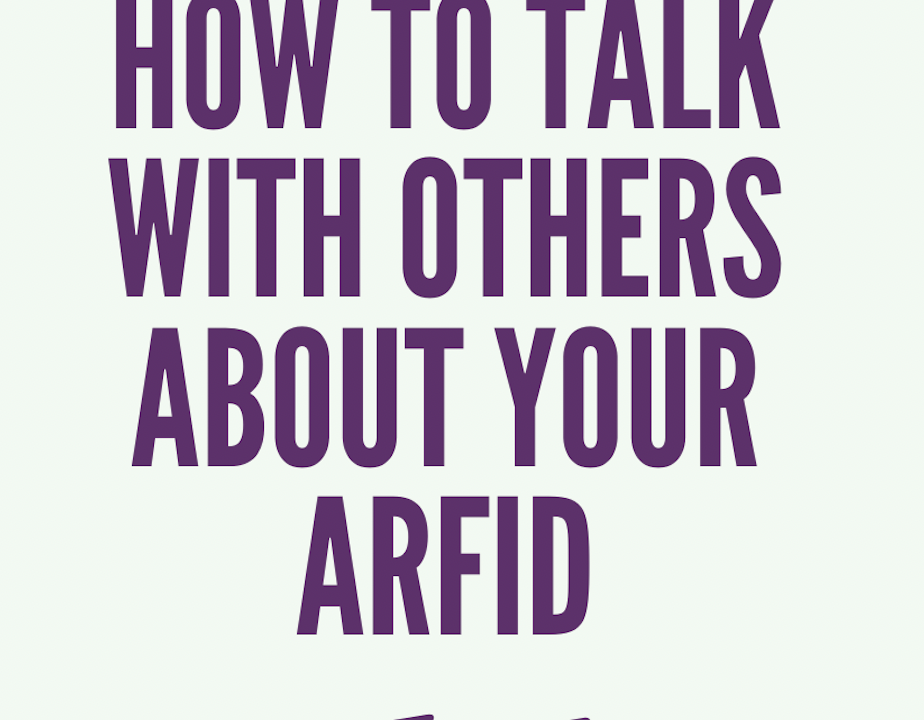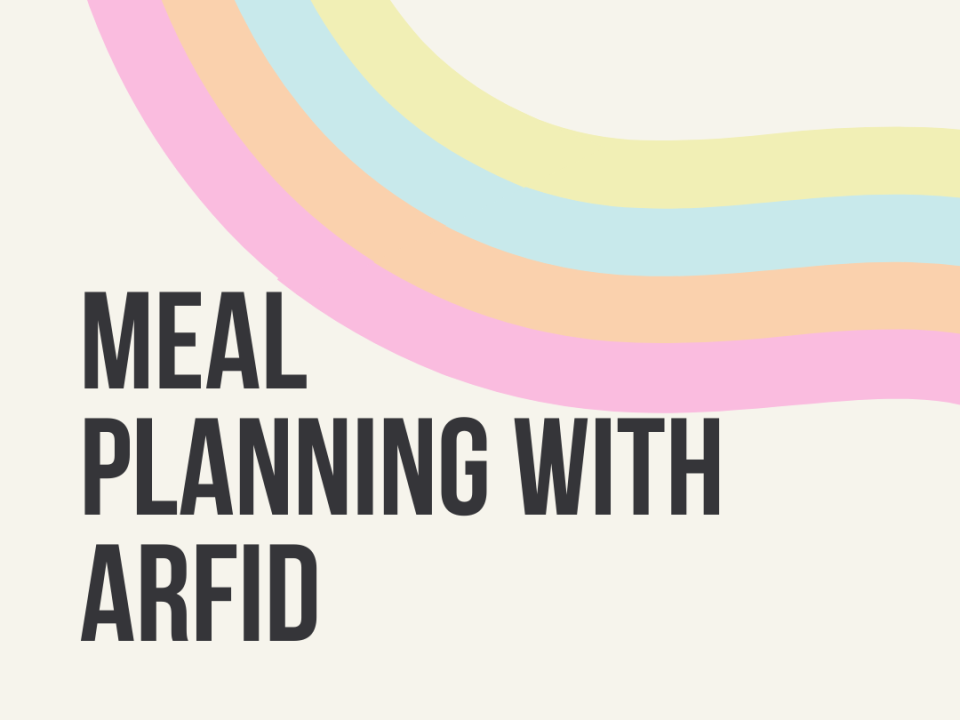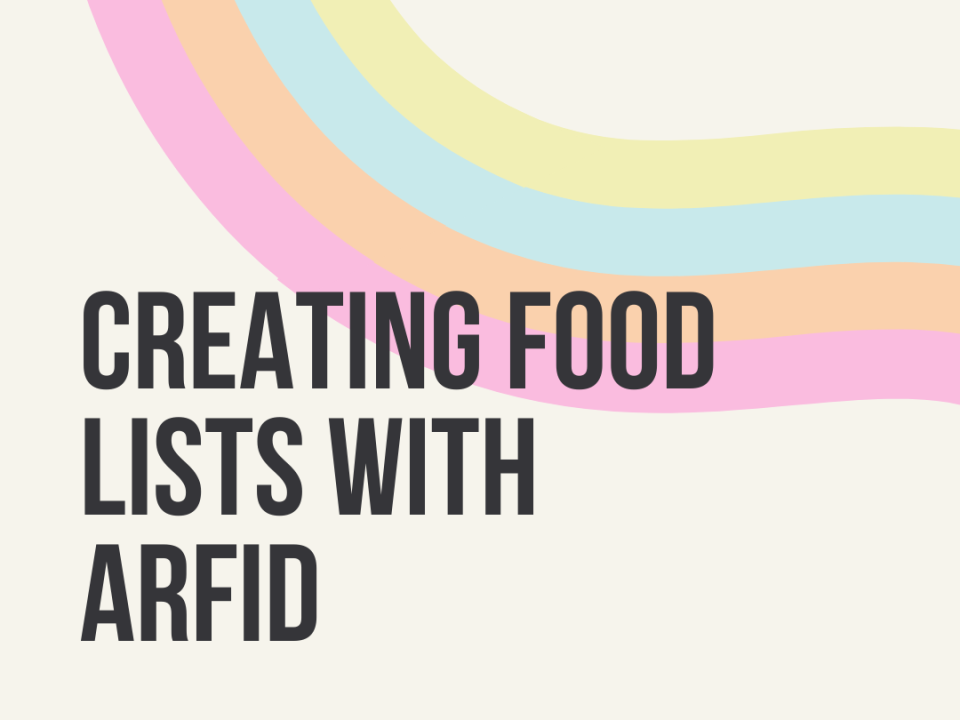ARFID + Emetaphobia and Becoming a Dietitian

15 Ways to Try a New Food (Without Eating It)
February 13, 2023
Accommodations and Making Eating more Accessible with ARFID
May 3, 2023Thank you Amanda for sharing your experience to help others feel less alone! In a follow up post Amanda will be sharing accommodations that have made eating more accessible for her.
Author: Amanda Wagner (she/her/hers)
Trigger Warning: emetaphobia
My name is Amanda and I am an avid competitive runner, a Registered Dietitian, and I live in Chicago with my husband + cat! I also happen to have ARFID. This is a very vulnerable post for me to write and share, but in doing so I hope that I can help others feel less alone and show that even people in the dietitian profession can develop ARFID.
I was officially diagnosed with ARFID in December 2021 and it was triggered by an upsetting genetic health diagnosis earlier that year, but I suspect I’ve had ARFID in some form my entire life. I developed emetophobia in late elementary school after throwing up multiple times a month for nearly a year for unknown reasons and still have emetophobia to this day after this experience. I have also had some sensory preferences with my food/eating all my life, that could be attributed to what I now know is ARFID. For full transparency, I am vegan and while this is mainly guided by ethics for me, I will also be honest and say it is also because I’ve never enjoyed the taste, smell, or texture of most meat and seafood, so it was an easy transition for me many years ago (I went vegetarian in 2013 and vegan in 2018). I will not judge others, with or without ARFID for eating meat themselves though. What you eat is a highly personal choice and guided by many factors, especially if you have ARFID.
Mid 2021 is when my fear of food/eating and food avoidance symptoms worsened and started to significantly impact the quality of my life. I sought therapy in summer 2021 for the anxiety and depression associated with my upsetting health diagnosis and my decreasing variety and amounts of foods I was able to eat. My emetophobia worsened at this time too. Even as someone studying to become a registered dietitian at that time, I did not understand what I was dealing with because we did not learn much about ARFID in the classes I took. It took a keen provider who suggested I don’t just have anxiety, but rather ARFID for me to realize ARFID is not just seen in kids. Other providers initially thought I was dealing with anorexia because of my low weight (I’ve been underweight most of my life), though, and finding a treatment team was frustrating and tough at first. Especially because I had a more body image based eating disorder many years ago (I am now 30), but my struggles were now due to food fears and avoidance, rather than body image concerns. So from personal experience and as a Registered Dietitian myself, I understand firsthand how frustrating it can be just to get an ARFID diagnosis and to be mistaken for more commonly understood eating disorders in the process.
For all those reasons and more, I’m so excited to help others with ARFID by helping Lauren run monthly adult ARFID support groups and by drawing on my personal experience + my professional experience as a Registered Dietitian. While living with ARFID can be challenging, and recovery means different things for different people, you can still reach your goals and live a fulfilling life. Despite my ARFID, I was and am still able to run competitively and I reached my career goal of becoming a Registered Dietitian myself in December 2022! There were speed bumps along the way and I actually delayed sitting for the Registered Dietitian exam from late 2021 to the end of 2022 because I needed a longer time to work on my recovery and dealing with my other genetic health condition before I felt in a good enough place to work and take the exam. I say this from a place of privilege as I was given the time and support from my husband and family members to do this work on my ARFID recovery and with genetic health condition. But I won’t sugar coat it either. It was and remains hard work! And to get to this point I have learned how to make eating more accessible and accommodate myself in a variety of situations, so I thought I’d share some of my strategies with all of you in a separate post coming soon.
Part 2: Accomodations and Making Eating Accessible with ARFID
ABOUT AMANDA WAGNER, M. Ed., RD
 Amanda (she/her/hers) is a Registered Dietitian and avid runner who lives with her husband and cat Bria in Chicago. Amanda was diagnosed with ARFID in 2021 after an upsetting health event. Amanda has also experienced sensory preferences with food and eating most of her life and struggled with emetophobia and a body image based eating disorder. She is excited to help people with ARFID by drawing on both her personal and professional experiences. While living with ARFID has been challenging, she has been able to run competitively and was able to reach her career goal of becoming a Registered Dietitian.
Amanda (she/her/hers) is a Registered Dietitian and avid runner who lives with her husband and cat Bria in Chicago. Amanda was diagnosed with ARFID in 2021 after an upsetting health event. Amanda has also experienced sensory preferences with food and eating most of her life and struggled with emetophobia and a body image based eating disorder. She is excited to help people with ARFID by drawing on both her personal and professional experiences. While living with ARFID has been challenging, she has been able to run competitively and was able to reach her career goal of becoming a Registered Dietitian.
Amanda helps facilitate our weekly Adult ARFID Support Groups and ARFID Community. Head here to learn more!
Connect with Amanda: Instagram @fueling.veggie.athletes/ Email: fueling.veggie.athletes@




